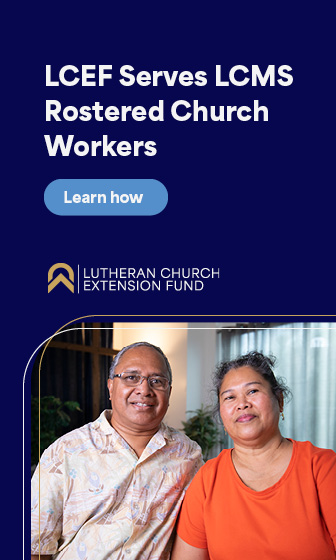By Joe Isenhower Jr.
NEW ORLEANS — Although the 2005-06 operating budget adopted by the LCMS Board of Directors pares $750,000 from the proposed budget for the fiscal year starting July 1, the final budget does not cut national ministries significantly but even allows adding new missionaries and increasing subsidies to colleges and seminaries.
Referring to $1.4 million in reductions already in the budget presented to the Board at its May 23-24 meeting here, Dr. Thomas Kuchta, the Synod’s vice president–finance/treasurer, said the latest reductions “are for the most part in support services.”
The Board approved a total national-Synod spending plan — or operating budget — of $81.8 million for the upcoming year. That compares with an $85.6 million spending plan for 2004-05.
Kuchta and Charles Rhodes, executive director of accounting for the Synod, presented the proposed budget to the Board.
They explained that an additional $250,000 in cuts would be necessary to balance the 2005-06 budget, and that they were recommending another $500,000 to serve as a contingency reserve for the year.
Kuchta said a “major factor” in the cuts was a $419,000 decrease in pledges from districts to the national Synod. Pledges for this year total $20,311,000, down from last year’s $20,730,000.
He said that 14 districts have reduced their pledges compared with the previous year.
“The Synod has reduced its expenditures,” Kuchta told the Board, “but districts need to make sure the Synod isn’t the first to suffer when income is reduced.”
He added that the pledge decrease would be partially offset by a projected increase of $225,000 over the current year in undesignated bequests, special gifts, and funds from the Marvin M. Schwan Charitable Foundation, the Lutheran Church Extension Fund, and Concordia Publishing House.
The national Synod departments that took reductions from the budget proposed to the board are Mission Services ($150,000 in reductions), Pastoral Education ($250,000), University Education ($250,000), and Communication Services ($50,000), as well as the emphasis known as Recruitment and Retention ($50,000).
Kuchta said that in the case of each of those areas, the cuts are within a range that could be made “without significantly cutting current programs.”
In fact, he said that the Board for Mission Services’ 2005-06 budget still allows for adding nine new missionaries and three office support staff and the budgets of the Board for University Education and the Board for Pastoral Education allow increasing support for the colleges by $250,000 and the seminaries by another $250,000.
The Board also approved a capital budget of $1,059,406 for the 2005-06 fiscal year.
In other action, the Board of Directors gave final approval to the “Fan into Flame” funding effort adopted by last year’s Synod convention to support the vision of the Ablaze! initiative.
That vision originated with LCMS World Mission as a challenge to share the Good News of Jesus with 100 million “unreached” people worldwide by 2017, the 500th anniversary of the Reformation.
The 2004 convention action specified that the fund-raising goal would be “above the LCMS World Mission budget,” affirmed the urgency of reaching 50 million unreached people in the United States, and set a national goal of starting 2,000 new LCMS congregations by 2017.
In his oral report to the Board, Synod President Gerald B. Kieschnick said that he shared information about Ablaze! with President George W. Bush during a White House briefing with U.S. Protestant leaders early last month.
Kieschnick said Bush responded with, “You’re really cooking!”
He said he also shared with Bush a theme passage for the “Fan into Flame” campaign, from 1 Tim. 1:6 (“… I remind you to fan into flame the gift of God…”).
Kieschnick told the Board that in addition to making comments about his program on community and faith-based initiatives and his stands on abortion and other topics, Bush talked with the church leaders about his “personal walk” with Jesus and his need for salvation.
Kieschnick also said that he has appointed 14 members to the new Blue Ribbon Task Force on Synodical Structure, which has set its first meeting for July 26.
Board Chairman Robert Kuhn welcomed Ron Schultz to his first Board of Directors meeting as the Synod’s chief administrative officer. The Board elected Schultz to that post in April. His installation was May 3.
The Board accepted “with regret” the resignation of Ted Kober as one of its members.
Kober, of Billings, Mont., is president of Ambassadors of Reconciliation, a newly formed organization that had been approved as a Recognized Service Organization of the Synod.
In his letter of resignation, Kober said the organization’s board determined “it is prudent” for him to resign from membership on the Synod Board, adding that he agreed with that determination.
In late April, Synod Secretary Raymond Hartwig sent a letter to LCMS national and district board members, asking for nominations to fill the vacancy, with a June 1 deadline for submitting those nominations.
The Board appointed three members to the Synod’s Commission on Structure. They are Rev. Alan J. Barber of Greencastle, Ind.; Dr. Walter Rosin, Shawano, Wis.; and Rev. Marvin Temme, Torrington, Wyo. The Board had appointed two other commission members in February — Rev. George Gude of Dorsey, Ill., and Rev. Richard Nuffer, Fort Wayne, Ind.
The Board agreed to a request for a five-year lease on space at the International Center for Concordia Historical Institute (CHI) to use for museum exhibits about the history and ministries of the Synod. That space formerly had been used for the International Center’s library and TV studio.
That action also gave CHI the green light to solicit congregations for financial support to launch the museum and lay out plans for providing for the annual operating costs of the museum.
In other action, the Board approved changes to the master plans for Concordia University, Seward, Neb., and Concordia University Wisconsin, at Mequon.
During the two days prior to the meeting here, Board members participated in a retreat on enhancing interpersonal relationships. Dr. Leslie Fyans of Springfield, Ill., led the sessions.
Posted May 27, 2005




